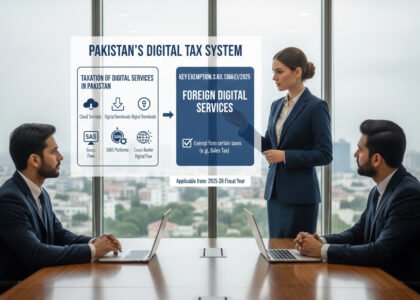Section 140 of the Income Tax Ordinance, 2001, empowers the Commissioner Inland Revenue to recover tax dues by serving notices to third parties (such as banks or employers) who may hold or owe money to the taxpayer. While the power appears broad, it is not unlimited.
In a landmark Supreme Court judgment dated July 15, 2025, the Hon’ble Court clarified that coercive recovery under Section 140 must follow due process and cannot bypass statutory safeguards.
The Legal Text of Section 140 – Explained
Section 140 allows the Commissioner to issue a notice to any third party who:
Owes money to the taxpayer,
Holds money on behalf of the taxpayer,
Is authorized to pay money to the taxpayer,
Holds money on behalf of another person intended for the taxpayer.
Such third parties may be:
Banks,
Employers (for salaries),
Government departments,
Business partners, etc.
The notice must state:
The amount to be recovered,
The due date for payment,
The legal basis of recovery.
Key proviso added:
If the taxpayer has filed an appeal under Section 127, no notice under Section 140 can be issued unless the taxpayer has deposited 10% of the disputed tax.
Supreme Court’s Ruling – July 15, 2025
Published in Dawn, July 15th, 2025
In two consolidated appeals involving Pakistan LNG Ltd. and Serene Air Pvt. Ltd., the Supreme Court of Pakistan held:
“Section 140 does not permit coercive recovery without due notice or clarity. The tax authority must respect procedural fairness.”
Key Takeaways from the Judgment
No ‘grab and go’: Recovery cannot be made abruptly without due process.
Proper notice required: Notice under Section 140 must clearly state the date, amount, and context.
If appeal is pending: The Commissioner cannot issue a recovery notice unless 10% of the disputed demand has been deposited.
Recovery without due notice is illegal.
FBR must act as a facilitator, not merely an enforcement body.
Justice Ayesha Malik emphasized:
“Tax recovery is not a penalizing act. It requires procedural transparency, clarity, and legal certainty.”
Practical Example
Scenario:
ABC Bank receives a notice under Section 140 from the Commissioner requiring it to debit a taxpayer’s account and remit PKR 5 million to FBR.
Before debiting, the bank must ensure:
The notice is valid under law,
A due date is mentioned,
The taxpayer has not filed an appeal without the 10% payment,
No stay or court order is in place.
If these are missing, the bank risks violating the Supreme Court’s interpretation and may become liable for wrongful deduction.
Summary of Compliance Under Section 140
| Compliance Requirement | Legal Basis/Reference |
|---|---|
| Written notice with date and amount | Section 140(1) |
| 10% tax paid if appeal filed | Proviso to Section 140(1) (post-127) |
| Cannot recover before due date | Section 140(4) + SC Judgment |
| Third party’s liability ends after payment | Section 140(6) |
| Due process required for coercion | Supreme Court (15 July 2025) |
H2: 20 FAQs – Section 140 Recovery from Third Parties
What is Section 140?
It allows FBR to recover tax from any person who holds or owes money to the taxpayer.Can FBR debit my bank account directly?
Yes, but only if due process is followed, including notice, due date, and appeal provisions.Is there any protection if I have filed an appeal?
Yes. No recovery notice can be issued if your appeal is pending unless 10% tax is paid.What if no date is mentioned in the notice?
As per SC, such a notice is invalid and cannot be enforced.Can a bank refuse to comply with an invalid notice?
Yes, banks must verify legal compliance before acting.Can recovery be made on the same day as order issuance?
No. The SC held that same-day recovery without procedural steps is unlawful.Can FBR recover tax from my employer?
Yes, for example, through salary, in installments, until recovery is complete.What if FBR wrongly recovers tax from a third party?
The taxpayer can seek refund and also challenge the notice in High Court.Is prior intimation to the taxpayer required?
Practically, yes. The Supreme Court stressed procedural fairness and prior awareness.Can FBR recover from a partner or vendor?
Yes, if they hold your money or are scheduled to pay you.Can I challenge a Section 140 notice?
Yes, through constitutional petition under Article 199 of the Constitution.Does recovery apply to disputed taxes?
Only if no appeal is filed or the 10% tax isn’t paid when appeal is pending.What if my income is under exemption?
If you’re not liable, recovery can be challenged via documentation and appeal.Is interest charged on recovery under Section 140?
Not under 140 directly, but default surcharge may apply under Section 205.Can recovery notices be issued via email or IRIS?
Yes, as long as acknowledgment and timing requirements are met.Is there a limit on the amount to be recovered?
The recovery amount cannot exceed what is held or owed by the third party.Can the Commissioner issue repeated notices?
Yes, until the full tax liability is recovered, provided the law is followed.Is the Supreme Court judgment binding on all cases?
Yes, all lower courts and FBR are bound by it under Article 189 of the Constitution.Who can be treated as a ‘person’ under this section?
Any individual, bank, institution, Court, or Tribunal.Can the taxpayer sue the Commissioner for wrongful recovery?
Yes, in certain cases of abuse of power, the taxpayer may seek remedies.
Disclaimer
This article is intended for informational and educational purposes only. It does not constitute legal or financial advice. Please consult a qualified tax advisor or lawyer before acting on any information provided here.






